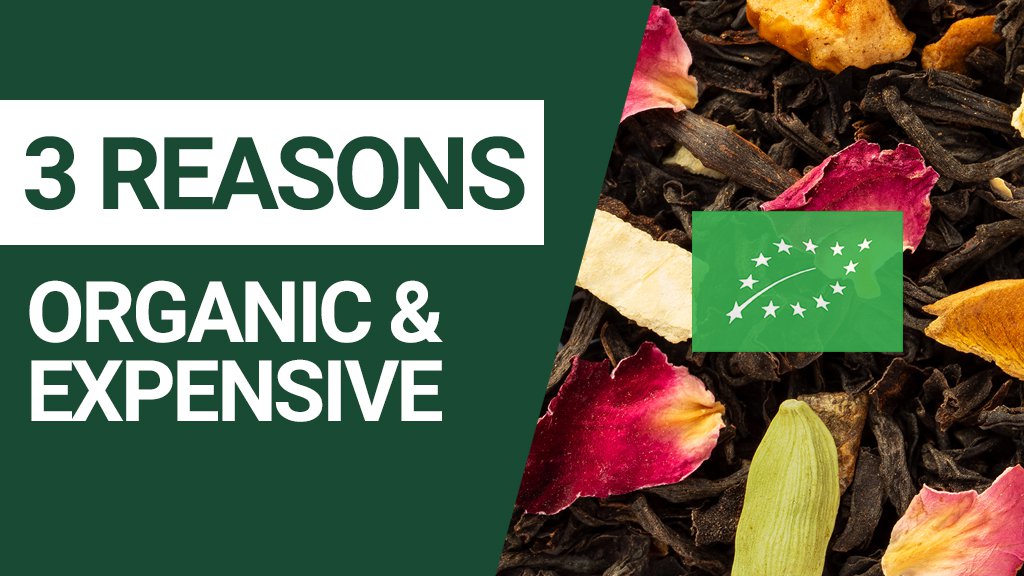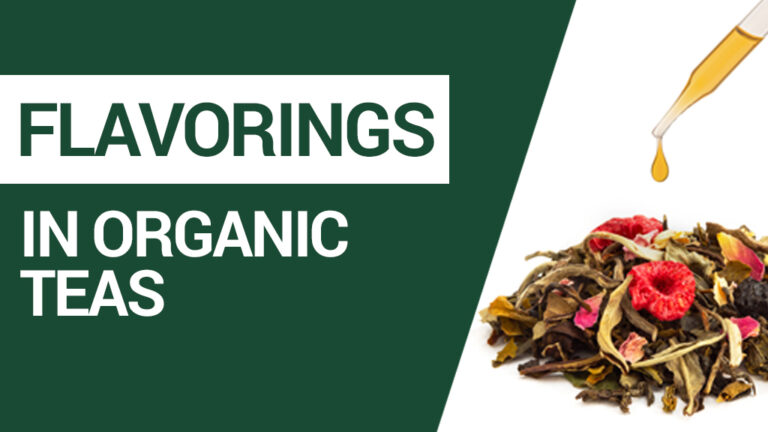In the last 2 decades, tea lovers worldwide turned more and more to organic options. But despite the growing interest, prices for organic products generally remain higher than their non-organic equivalents.
As a tea professional in contact with your customers, you must “explain” yourself in many situations. And one of the most recurring questions is why organic tea is more expensive than conventional tea.
To sum up, 3 elements make the pricing of organic tea more costly:
- It is more expensive to produce,
- The costs associated with importing the goods are higher,
- Flavoring substances are usually more expensive.
Let’s dive into each of these reasons behind the higher price tag.
Table of contents
ToggleOrganic tea is more expensive to produce.
It’s the main factor.
Organic tea is simply more costly to produce.
Here’s why:
- Farming Methods: Organic tea cultivation avoids using pesticides, herbicides, and chemical fertilizers. Instead, farmers rely on natural alternatives, such as organic compost and natural pest control methods. These techniques are more labor-intensive and time-consuming, leading to higher production costs.
- Lower Productivity: Without synthetic fertilizers and pesticides, organic farms may not produce as much tea per hectare. This means that farmers often have to dedicate more land and resources to achieve the same output as conventional farms.
- Certification Costs: Farmers must undergo a certification process to label their tea as organic. This process includes regular inspections, documentation, and ongoing fees to ensure compliance with organic standards. These costs add up and ultimately affect the price.
- Manual Labor: Unlike conventional farms that can rely on chemical weed control, organic farms often require manual weeding. This means more hands-on labor, which increases overall expenses.
- Ethical Labor Practices: Sure, it does not apply to every brand, but some are committed to fair trade principles. This ensures better wages and working conditions for tea pickers, which can result in higher labor costs.
Importers carry more cost per imported unit.
Importers buy and organize transportation of organic products for lesser quantities than conventional tea.
Organic consumption varies in each country. But for most Western countries, it represents about 12% to 15% of food consumption. So the imported volumes of conventional products are 6 to 8 times higher than for organic products.
Imagine you import tea in Europe from China. It does not matter if you transport 1 full container or only 1/6th of it. It will be the same administrative work and the same costs to run the analysis for food safety. So per kilo imported, those costs have more weight in the final price of organic goods.
Flavorings are more expensive.
The final reason concerns scented teas only.
Since 2022, the European law has imposed tea suppliers to blend teas with “FTNF” substances. In a nutshell, these flavoring substances used to aromatize teas and herbal teas must come from the fruit itself.
Let me give an example with vanilla:
Vanilla naturally contains Vanillin, the main organic compound giving the taste of vanilla.
Obviously, you can create vanilla flavorings by extracting vanillin from vanilla pods. But you can also extract vanillin from other sources, like some tree species. It’s still a natural source, but it’s not from vanilla pods anymore.
Okay, but where does the vanillin have to come from so you can label tea as organic in Europe?
That’s the tricky thing:
Before 2022, tea suppliers were allowed to use natural flavorings with a vanilla taste that didn’t necessarily come from vanilla pods. Other natural sources were accepted (like tree species).
Since 2022, you have to extract the vanilla taste from the vanilla itself if you want to brand your tea as an organic product with a vanilla taste. And the type of flavoring you use then is called “FTNF”.
And FTNF stands for “From The Named Fruit”.
On one side, FTNF flavorings are great, because you know from where it has been extracted.
But in terms of costs, these flavorings are extremely expensive.
And for some tastes, the price increase is dramatic. That’s the case for bergamot aroma which can cost 5 times more than the natural flavorings tea suppliers used to have for organic teas before the 2022 EU regulation.
Same thing with exotic tastes like mango, or red fruits like strawberry and raspberry. Those are amazingly expensive.
And this adds up to the final price as well.
Final thoughts for your customers.
So, the next time you stock up on organic tea, remember you’re paying for more than just a certification.
From sustainable farming practices to the type of flavorings used, a lot is happening for each batch of organic tea. This commands indeed a higher price tag that can’t be avoided but also reflects a commitment to producing tea that’s good for people and, in the end, better for the planet.




